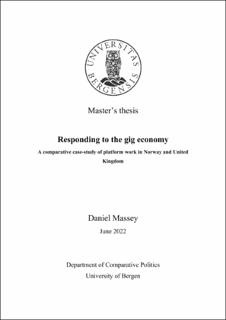| dc.description.abstract | The rise of the gig economy is a challenge facing many established economies in Europe. The ongoing digital transformation of society has resulted in rapid changes to the labour market. Work through digital labour platforms is one of the rising trends in the gig economy. Workers are categorised as self-employed, but work under strict control from the platform companies. The division between being self-employed and being employed is becoming less distinct, and more people fall into a grey area between the two categories. The theoretical framework for this analysis is the Varieties of Capitalism theory by Hall and Soskice, which distinguishes between two types of political economies; liberal market economies and coordinated market economies. The theory argues for a more significant divide between countries’ responses to the gig economy based on existing institutional arrangements. By utilising qualitative document analysis to do a comparative case study of Norway and the UK, this thesis aims at identifying enabling and restricting factors to the growth of platform work. The Norwegian and UK governments have published public reports on the gig economy and the challenges of platform work. The analysis of these documents identifies several restricting and enabling factors that support a greater divide between the two countries in their response to the gig economy. The highly regulated labour market in Norway, with strong unions, tripartite cooperation and high coverage of collective agreements, are factors that should restrict the growth of platform work. The emphasis on flexibility in the UK labour market, firm-level wage negotiations and weaker unions are factors that should enable the growth of platform work. The problem of misclassification of workers is found to be a restricting factor in both countries. In the UK, workers must be classified as employees or workers to be entitled to the National Minimum Wage. Whereas in Norway, the classification of workers is important because of the collective agreements’ role in regulating the labour market. | |
